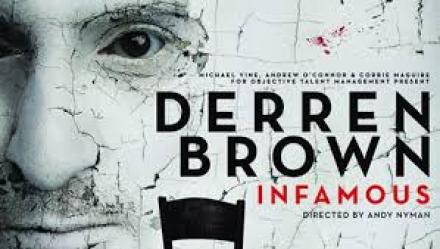
I'd had a hectic time this week so decided not to review Derren Brown's new show, Infamous, at The Palace Theatre. Looking at the reviews that have now appeared I'm torn. Part of me wishes I'd reviewed it. Part of me is glad I didn't. It sounds brilliant, a more compassionate form of the high status mentalism he has been peddling for the last decade. The difficulty for reviewers, however, is that as with previous shows critics were asked at the start not to give away any of the show's details.
Most of the critics have abided by this, merely hinting at the spectacular tricks that took place. But it raises the perennial problem of reviewing. Spoilers. Whether it is saying that – major spoiler ahoy – Bruce Willis is dead in The Sixth Sense or revealing whodunnit in The Mousetrap (I bet it was the butler) critics are always pilloried for giving too much away.
This is a particular problem in reviewing stand-up comedy, which still remains a fairly new form of arts journalism in the UK. Aziz Ansari recently said that one of the reasons he likes playing the UK was that his stand-up gets taken more seriously on this side of the Atlantic and he gets reviewed alongside proper grown-up theatre. As comedy should be. It occupies a distinctive place in the arts, being both pure entertainment and thought-provoking and tapping into the emotions of the audience in a uniquely direct way.
There is a self-imposed convention among comedy critics that we do not actually repeat jokes in reviews. I usually abide by this. Though, of course, gags are probably what commissioning editors want – so that readers can have at least one guaranteed giggle on the page. Instead we try to write 'around' the joke or 'about' the punchline without sounding too dry or academic. But at the risk of making it sound as if comedy reviewing is like grafting in some gulag it can often be difficult and demanding. You do your best and you can't win. Earlier this year I gave Sean Hughes a rave review. I thought he'd be delighted but word came back to me that I'd revealed too much about the show. Silly me. All I thought I was doing was writing something that I hoped would encourage people to buy tickets.
Yet stand-up comedians often spend the best part of two hours onstage telling jokes. Is it really so bad to print a couple of crackers? Well, the trouble is that the temptation will be to print the best zingers. The ones that really killed and got the loudest laughs. That feels wrong. It really would ruin it for future gig-goers. On the other hand if you just reprint ones that only got a ripple of titters then maybe you are not doing the performer justice. Plus a lot of gags die on the page without the timing, tone and charisma of the perfomer. So maybe it is best to resist altogether. If there are three jokes that are zingers, just say there are three zingers in as interesting a way as possible.
Then, of course, there are the comedy shows that feature a bit of a coup de theatre. This has been a trend in recent years, giving shows extra emotional oomph. Des Bishop brought his dad onstage, Katherine Ryan brought her mum onstage. Brendan Burns revealed that the two people he had been arguing with in the audience were plants. There will no doubt be examples of this in Edinburgh this year and to give away these pay-offs would really spoil the fun for everyone.
So when I write reviews getting the balance right is like trying to cook a soufflé using a camping stove without it collapsing. Too much information and you'll upset the thin-skinned acts. Too little and you won't really convey what the show is about. Of course, all of this is becoming redundant, a bit like critics themselves if they can't write properly and imaginatively. If a punter wants to know exactly what an act was like they can just click on YouTube. Last week I was briefly in Paris and went to see Franz Ferdinand do a free concert. I couldn't get in so I went home. By the time I logged on there was already footage of the gig online.
So is there much point resisting the urge to print the funnies when they are all over cyberspace? Well yes. Good critics should not need to go to those lengths to say what a gig is like. Good critics should be able to hint, give a taste, say what it was like to be there, without spelling it out. In fact thinking back to that polite Derren Brown request, he could have been less polite and just said "will critics who are not sophisticated, talented and hard-working enough to write a review without giving the plot away please eff off back to journalism school."



